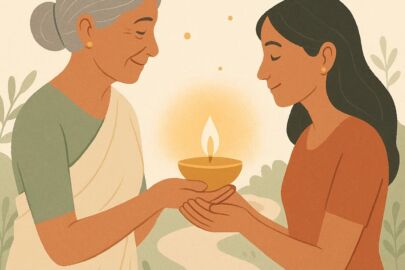
In most Indian homes today, the walls speak. They hold degrees framed proudly, photographs from family holidays, souvenirs from foreign trips, even the first car keys tucked away hanging like prized possessions. Each of these whispers of a life well lived. But while the walls hold fragments, the full story often remains untold.
Seniors carry within them entire libraries of experience. They were witness to India’s great transformation: from landlines to smartphones, from scarcity to abundance, from joint families to nuclear ones, from slow trains to global airlines. They built careers, raised families, and bridged eras.
Yet, too often, those stories stay locked away in memory.
What if we changed that? What if every senior made the decision to write their biography, not as a public book to sell, but as a personal gift to their family?
This is not just about leaving behind a record. It is about engaging with your own life, exercising your mind, and passing forward the wisdom you’ve earned.
Why Every Senior Must Write
1. Because you lived through India’s transformation
You are the generation that straddled two Indias: the one where people queued for ration and the one that now orders groceries in ten minutes. You remember Doordarshan evenings and the first cable channels. You celebrated the arrival of the Maruti 800, the first computer in the office, the liberalization of 1991.
You also saw cultural shifts: Amitabh Bachchan rise as the “angry young man” in the 1970s, Sachin Tendulkar symbolise hope in the 1990s, and Infosys campuses redefine aspiration in the 2000s. You were there when India won the 1983 World Cup and when Chandrayaan-3 landed on the moon.
If you don’t write your experience, who will tell future generations what it felt like to be part of this extraordinary shift?
2. Because your story connects generations
Children and grandchildren today inhabit a world of apps that promote doomscrolling, AI that gives instant solutions, and start-ups that enable all these. They may respect you deeply, but they rarely know the richness of your inner journey. When you write your story, you bridge that gap.
Think of the conversations your biography could spark:
- Your grandson might suddenly see that his anxiety over college isn’t new. You too felt the same butterflies during your IIT entrance prep.
- Your granddaughter might draw courage from reading how you navigated a male-dominated workplace in the 1970s.
- Your children may finally understand why you insisted on certain values, like saving before spending, or the importance of Sunday family meals.
Biographies are bridges. They collapse the distance between generations and replace “Papa” or “Nani” with a fully fleshed-out human being.
3. Because writing is good for your brain
Science consistently shows that expressive writing is a form of therapy and prevention.
- A 2022 review confirmed that journaling significantly reduced stress and improved well-being among older adults (PMID: 35010919).
- Another meta-analysis demonstrated that reflective writing strengthens psychological health and self-understanding (PMID: 31939735).
- Clinicians also note that life review exercises improve memory recall and may delay cognitive decline (PMID: 32039917).
I want to claim that writing is like mental yoga. Just as you do pranayama to expand lung capacity, writing stretches memory, sharpens recall, and fosters inner peace.
And unlike puzzles or Sudoku, writing gives you something tangible: a story your family will cherish forever.
Common Concerns (and Why They’re Myths)
“My life is not interesting enough.”
You underestimate yourself. You raised children through scarcity and opportunity. You navigated arranged marriages and globalized workplaces. You bought your first home when loans were rare. You transitioned from writing letters to video calls. These are extraordinary shifts.
Remember, R.K. Narayan’s Malgudi Days became iconic not because it was dramatic, but because it captured ordinary life with honesty. Your biography will do the same for your family.
“I don’t write well.”
You don’t need to be Arundhati Roy. Write the way you speak. Or dictate into WhatsApp voice notes and then a tool to transcribe this. Truth matters more than style. Many seniors today use apps to record oral histories, later transcribed by children.
“It’s too late.”
It’s never too late. Take inspiration from Karthyayani Amma who passed her literacy exam at 96. Age adds richness, your hindsight makes your biography deeper and wiser.
“I don’t want to revisit painful memories.”
You choose what to include. But often, even difficult moments carry lessons. Writing them can bring closure. And what you call pain, your grandchildren may see as courage.
The Legacy Imperative
Us indians pride ourselves on leaving behind houses, jewelry, and investments. But the real treasure is not material. It is wisdom.
Imagine your granddaughter in 2030 reading about your first salary of ₹300, or your struggle to choose between a government job and a private company. Imagine her discovering that you too once felt uncertain, yet you built a life of meaning.
A biography is not inheritance, it your opportunity to share your stories for the next generations.
The Neuroscience of Storytelling
Writing your story is not just sentimental, it is neurological nourishment. Storytelling activates memory, language, and emotional centers together. This kind of integrated brain activity strengthens neural connections.
That is why life review therapy is used in geriatric care worldwide (PMID: 32039917). Patients who narrate and reflect on their lives often show reduced depression, greater clarity, and improved quality of life.
Every time you recall an old memory, describe it, and link it to your values, you are exercising your brain like a muscle. You are keeping your mind resilient, while leaving behind a map of your journey.
How to Begin
Start small. Don’t try to write a 300-page book from day one. Instead, begin with short pieces.
- Write one page on “My first job interview.”
- Describe the house you grew up in. What smells, sounds, and tastes defined it?
- Write a letter to your younger self at 25.
Use themes. Think of your life as a collection of chapters:
- Education
- Career choices
- Family rituals
- First home
- Holidays and travel
- Challenges overcome
Make it practical. Fifteen minutes a day is enough. Write after your morning tea, or before bed.
Involve family. Ask your grandchildren to interview you. Their curiosity will unlock stories you thought you had forgotten.
Seek support. Structured programs like Your Life, Your Legacy, Your Story provide prompts, exercises, and guidance. They make the process less daunting and more joyful.
A Call to Action
If you are a senior reading this, you have given us homes, education, and stability. Now, give us your stories. PS: If you are a younger one reading this, implore your elders to write.
Don’t let your grandchildren only know you as “Papa who read the newspaper every morning” or “Nani who managed the kitchen so well.” Don’t let your children inherit only property papers.
Give us your laughter, your doubts, your turning points, your fire.
And if you’ve ever thought, “One day, I’ll write it down,” let that day be today. Programs like Your Life, Your Legacy, Your Story exist precisely to help you begin.
Final Word
Our nation remembers Gandhi, Nehru, Ambedkar, and Kalam because they helped built the nation.
However, I want to claim that the India we inhabit today was built by you – the banker in Chennai, the schoolteacher in Jaipur, the homemaker in Ahmedabad, the engineer in Pune.
Your story is not vanity. It is duty. To yourself. To your family. To India.
So please: pick up a pen. Open your laptop. Record your voice. Begin today.
Because your grandchildren deserve more than photographs. They deserve your voice. They deserve your journey. They deserve you.
And once written, you will discover something profound: your story was never ordinary. It was always extraordinary. It only needed to be told.
Check out: Your Life, Your Legacy, Your Story



